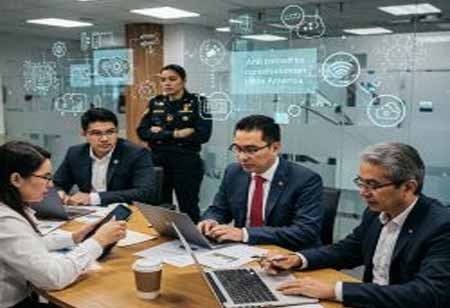THANK YOU FOR SUBSCRIBING
Be first to read the latest tech news, Industry Leader's Insights, and CIO interviews of medium and large enterprises exclusively from Gov CIO Outlook
THANK YOU FOR SUBSCRIBING

By
Government CIO Outlook | Wednesday, May 01, 2024
Stay ahead of the industry with exclusive feature stories on the top companies, expert insights and the latest news delivered straight to your inbox. Subscribe today.
Technological integration enhances city operations and resource allocation through smart streetlights that adjust brightness based on activity levels.
FREMONT, CA: Smart cities are revolutionizing urban landscapes worldwide, leveraging technology to enhance efficiency, sustainability, and the quality of life for citizens. IoT is at the core of smart city development, enabling the connection of various devices and sensors to collect and analyze data. Urban mobility is transforming with the rise of electric vehicles (EVs), autonomous transportation, and shared mobility services. Smart cities are investing in infrastructure for EV charging stations, developing connected and autonomous vehicles (CAVs), and promoting bike-sharing and ride-sharing initiatives to alleviate traffic congestion and improve air quality. Modern urban environments pose complex challenges addressed by smart cities, which utilize technology to solve them.
With the proliferation of IoT devices, cities can access vast amounts of data. Advanced analytics and artificial intelligence (AI) algorithms process this data to derive actionable insights, allowing policymakers to make informed decisions regarding infrastructure, transportation, public safety, and more. Smart cities prioritize sustainability by implementing eco-friendly infrastructure and renewable energy solutions. It includes adopting solar panels, energy-efficient buildings, green spaces, and integrated public transportation systems to reduce carbon emissions and minimize environmental impact. Digital platforms and mobile apps facilitate interaction between citizens and government agencies, enabling efficient service delivery and fostering community engagement.
Checkout This : Top Data Storage Solutions Companies
Citizens can report issues, access information, participate in decision-making processes, and provide feedback, enhancing transparency and accountability in governance. Smart cities prioritize resilience to withstand and recover from natural disasters and other emergencies. Predictive analytics and real-time monitoring can help cities better anticipate and respond to crises, ensuring residents' safety and minimizing infrastructure damage. Regardless of socioeconomic status, cities focus on inclusivity and equitable access to technology and services. It includes bridging the digital divide, providing decent housing, and promoting economic opportunities for marginalized communities.
Cybersecurity and data privacy become paramount concerns. Smart cities invest in robust cybersecurity measures for cyber threat protection while prioritizing data privacy laws and regulations to maintain trust and transparency with citizens. Smart cities embrace circular economy principles to minimize waste and maximize resource efficiency. It involves implementing recycling programs, waste-to-energy facilities, and sustainable procurement practices to create a closed-loop system that reduces environmental impact and promotes economic sustainability. Another key trend in smart city development is leveraging technology to enhance public health and well-being.
I agree We use cookies on this website to enhance your user experience. By clicking any link on this page you are giving your consent for us to set cookies. More info

However, if you would like to share the information in this article, you may use the link below:
www.govciooutlookapac.com/news/trends-redefining-smart-cities-nid-2150.html



